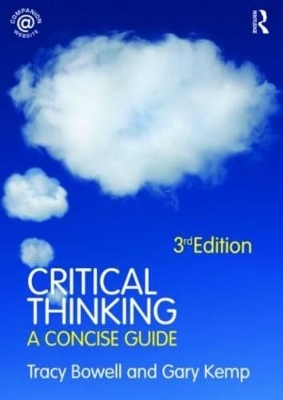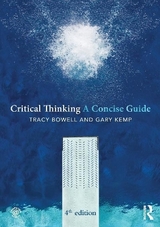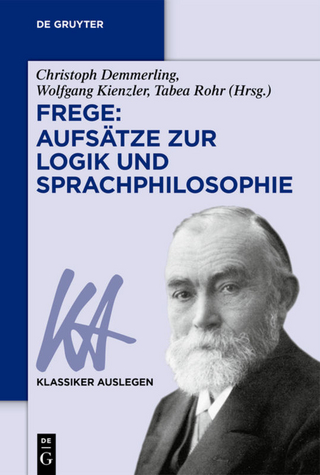
Critical Thinking
A Concise Guide
Seiten
2009
|
3rd New edition
Routledge (Verlag)
978-0-415-47183-1 (ISBN)
Routledge (Verlag)
978-0-415-47183-1 (ISBN)
- Titel erscheint in neuer Auflage
- Artikel merken
Zu diesem Artikel existiert eine Nachauflage
A guide to argument analysis. It presents an introduction to thinking clearly and rationally for oneself. It tells how to avoid common confusions surrounding words such as 'truth', 'knowledge' and 'opinion'; how to identify and evaluate the most common types of argument; and, how to spot fallacies in arguments and tell good reasoning from bad.
Critical Thinking: A Concise Guide is a much-needed guide to argument analysis and a clear introduction to thinking clearly and rationally for oneself. Through precise and accessible discussion this book equips students with the essential skills required to tell a good argument from a bad one.
Key features of the book are:
clear, jargon-free discussion of key concepts in argumentation
how to avoid common confusions surrounding words such as `truth’, `knowledge’ and `opinion’
how to identify and evaluate the most common types of argument
how to spot fallacies in arguments and tell good reasoning from bad
chapter summaries, glossaries and useful exercises.
This third edition has been revised and updated throughout, with new exercises, and up-to-date topical examples, including: `real-world’ arguments; practical reasoning; understanding quantitative data, statistics, and the rhetoric used about them; scientific reasoning; and expanded discussion of conditionals, ambiguity, vagueness, slippery slope arguments, and arguments by analogy.
The Routledge Critical Thinking companion website, features a wealth of further resources, including examples and case studies, sample questions, practice questions and answers, and student activities.
Critical Thinking: A Concise Guide is essential reading for anyone, student or professional, at work or in the classroom, seeking to improve their reasoning and arguing skills.
Critical Thinking: A Concise Guide is a much-needed guide to argument analysis and a clear introduction to thinking clearly and rationally for oneself. Through precise and accessible discussion this book equips students with the essential skills required to tell a good argument from a bad one.
Key features of the book are:
clear, jargon-free discussion of key concepts in argumentation
how to avoid common confusions surrounding words such as `truth’, `knowledge’ and `opinion’
how to identify and evaluate the most common types of argument
how to spot fallacies in arguments and tell good reasoning from bad
chapter summaries, glossaries and useful exercises.
This third edition has been revised and updated throughout, with new exercises, and up-to-date topical examples, including: `real-world’ arguments; practical reasoning; understanding quantitative data, statistics, and the rhetoric used about them; scientific reasoning; and expanded discussion of conditionals, ambiguity, vagueness, slippery slope arguments, and arguments by analogy.
The Routledge Critical Thinking companion website, features a wealth of further resources, including examples and case studies, sample questions, practice questions and answers, and student activities.
Critical Thinking: A Concise Guide is essential reading for anyone, student or professional, at work or in the classroom, seeking to improve their reasoning and arguing skills.
Tracy Bowell is Senior Lecturer in Philosophy at the University of Waikato, New Zealand. Gary Kemp is Senior Lecturer in Philosophy at the University of Glasgow, UK.
Chapter 1: Introducing Arguments
Chapter 2: Language and Rhetoric
Chapter 3: Logic: Deductive Validity
Chapter 4 : Logic: Inductive force
Chapter 5: The practice of argument-reconstruction
Chapter 6: Issues in argument assessment
Chapter 7: Pseudo-Reasoning
Chapter 8 :Truth Knowledge and Belief
| Erscheint lt. Verlag | 24.7.2009 |
|---|---|
| Zusatzinfo | 15 Line drawings, black and white |
| Verlagsort | London |
| Sprache | englisch |
| Maße | 174 x 246 mm |
| Gewicht | 534 g |
| Themenwelt | Geisteswissenschaften ► Philosophie ► Logik |
| ISBN-10 | 0-415-47183-4 / 0415471834 |
| ISBN-13 | 978-0-415-47183-1 / 9780415471831 |
| Zustand | Neuware |
| Informationen gemäß Produktsicherheitsverordnung (GPSR) | |
| Haben Sie eine Frage zum Produkt? |
Mehr entdecken
aus dem Bereich
aus dem Bereich
ein Gegenentwurf zum kurzfristigen Denken : so werden wir zu den …
Buch | Hardcover (2023)
REDLINE (Verlag)
18,00 €



